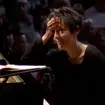‘We didn’t know’ – the young musicians chosen for secret premiere of lost Mozart work
3 October 2024, 15:05

Three string players share the story of playing a mystery manuscript – and reveal what it was like when they learned it was written by Wolfgang Amadeus Mozart.
Listen to this article
It’s probably quite common for a young musician to agree to play a piece of new music without knowing the full story behind the composition. It could be for an upcoming event or film, or be a new piece that a composer colleague has been anonymously working on.
But what if it was a newly discovered piece by Wolfgang Amadeus Mozart?
That’s exactly the position three young musicians from Leipzig found themselves in – being asked to learn and perform a piece of music that was so highly embargoed that they didn’t even know the famous origins.
Researchers at Leipzig municipal libraries had recently discovered the previously unknown manuscript, which experts then confirmed was written by the great Austrian composer. The short, seven-movement piece for string trio is believed to have been composed in the mid to late 1760s, when Mozart was a teenager.

Read more: ‘Mozart dropped a new single’ – fans queue to hear newly discovered work in Leipzig
The piece has been named Ganz kleine Nachtmusik. The first modern performance of it took place at a private event on 19 September at the composer’s birthplace in Salzburg, along with the announcement of the find. Then the world’s eyes all turned to the public premiere of the piece which would take place two days later in Leipzig.
Violinists David and Vincent Geer and cellist Elisabeth Zimmermann are all members of the Leipzig Youth Symphony Orchestra and had been selected for the prestigious public premiere. The players had only been given the untitled sheet music, the date and location of the performance.

“We were kind of relaxed,” said 16-year-old David Geer who played second violin. “Nobody could have ever imagined what it actually turned out to be.”
The exact source of the composition was kept under wraps with the trio diligently preparing the mystery music. They were only told that a secret would be revealed two days before the premiere performance on the steps of Leipzig Opera.
David continued: “Once we heard the news, that we were the ones performing the German premiere of a rediscovered piece by Mozart, in front of international media and a big audience, our first thought was: we need to practice more!”
“It certainly got our hearts beating,” said 17-year-old first violinist Vincent Geer.
On Saturday 21 September, eager Mozart fans formed 400-metre-long queues in Augustusplatz outside the Leipzig opera house. Everyone wanted to hear the piece of history being performed by these young musicians.

Read more: The 15 greatest pieces of classical music by Mozart
20-year-old Elisabeth Zimmermann, who played cello, told us about the charm of the music. “It is a nice short piece which fits perfectly with the other works by Mozart,” she said.
“The seven movements are short-lived but invite your mind to wander,” Elisabeth told us. “It feels a bit like you are transported back in time - and especially our second performance on the steps of the Leipzig Opera made me think, the piece might have been written for outdoor concerts - it just fits.”
The discovery and the performance then went viral, attracting the attention of international media and music fans around the world. “Mozart dropped new music for 2024,” many remarked. Watch their performance below.

W.A. Mozart - Serenate ex C - Ganz kleine Nachtmusik KV648 (official release)
“I am very happy so many people, young and old, are enjoying it,” Elisabeth said.
“It didn't even occur to us that we might have been chosen for something this big,” Vincent continued. “We thought it would just be an ordinary little gig – the only unusual part was that we would be performing at the foyer of the Leipzig Opera house - not a typical venue for short concerts.“
How did it feel to give the modern public premiere of a piece of Mozart? “It was our pleasure and an incredible honour,” they said.
We’re sure they are all pleased they said yes to the slightly cryptic and mysterious musical request, and made their mark on classical music history.
























